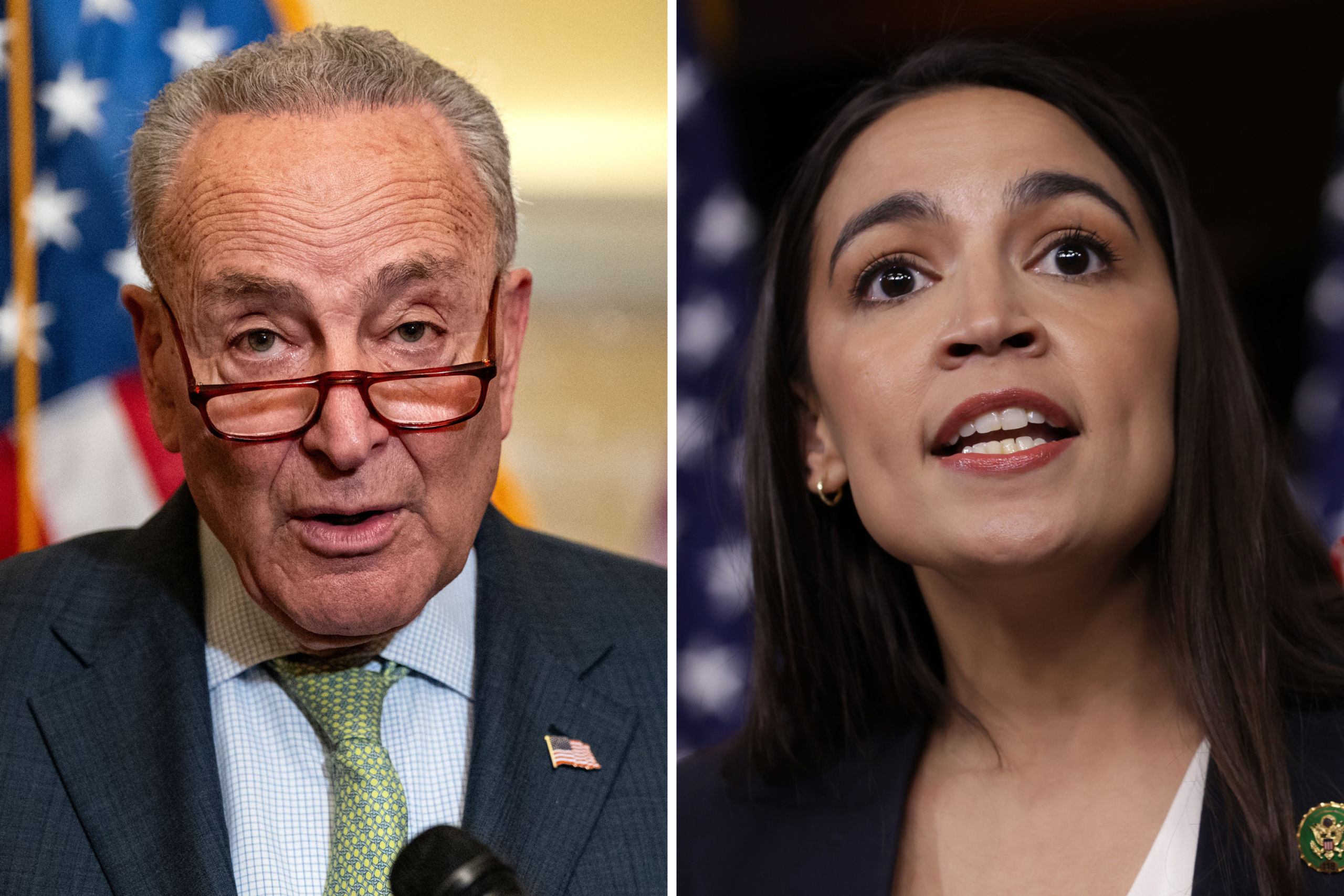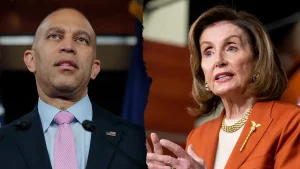A growing number of Democratic lawmakers and strategists are expressing frustration with Senate Minority Leader Chuck Schumer (D-N.Y.), following weeks of political gridlock that have left the federal government partially shut down and the party facing mounting internal divisions.
An editorial published Tuesday by the New York Post described Democrats as “dispirited and frustrated” after a 41-day shutdown that failed to yield significant policy concessions from majority Republicans. The editorial argued that the standoff — initially intended to pressure GOP leaders into extending pandemic-era healthcare subsidies — has instead deepened the perception of dysfunction within the party.
“Democrats pointlessly kept the government shut down for 41 days,” the editorial read, “purely to satisfy their left flank’s demand to ‘resist’ President Donald Trump.”
While Republican leaders have largely framed the shutdown as an avoidable misstep, the sharpest criticism of Schumer now appears to be coming from within his own ranks.
A Leadership Rift Within the Party
Multiple Democratic voices, including Rep. Ro Khanna (D-Calif.), have called for new leadership in the Senate, arguing that Schumer no longer represents the energy or direction of the party’s progressive base.
“Sen. Schumer is no longer effective and should be replaced,” Khanna said in a statement to reporters.
His comments underscore a broader debate among Democrats about how the party should respond to ongoing Republican control of both chambers. While establishment figures have emphasized compromise and institutional stability, the progressive wing has demanded a more aggressive approach toward President Trump and conservative policies.
Behind the scenes, rumors have circulated for months that Rep. Alexandria Ocasio-Cortez (D-N.Y.) — one of the most influential progressive figures in Congress — has considered launching a primary challenge against Schumer in 2028.
The Polling Shock
Those whispers gained traction this week after CNN reported that Schumer’s approval rating has fallen to its lowest point among Democrats in nearly four decades.
According to CNN chief data analyst Harry Enten, Schumer’s net approval among Democrats now stands at minus four, marking the weakest intraparty rating for any Democratic Senate leader since at least 1985. The data, compiled from Pew Research Center and FiveThirtyEight surveys, reflects a significant drop in confidence among the Democratic base.
“Look at this — least popular Dem Senate leader ever,” Enten said on CNN News Central. “He’s underwater with Democrats — his own party.”
Enten attributed much of the decline to perceptions that Schumer has been too cautious in confronting Republican initiatives.
“Democrats want a fighter,” Enten explained. “A large majority of Democratic voters believe Congress isn’t doing enough to push back against the president. That’s a big criticism of Schumer — and that’s why he’s underwater.”
Progressives Gain Ground
Pollsters noted that dissatisfaction with Schumer has been accompanied by a rise in support for progressive figures, including Ocasio-Cortez. Early polling data cited by CNN suggests that if she were to run against Schumer in a future primary, she could begin the race with a decisive advantage.
“Look at Alexandria Ocasio-Cortez running way ahead,” Enten said. “If she decides to challenge Chuck Schumer come 2028, she’s got a real leg up on the competition.”
The numbers appear to reflect a generational shift among Democratic voters. Younger progressives — particularly those under 40 — have become increasingly vocal in their demand for confrontational leadership, while older and more centrist Democrats favor experience and negotiation.
A Battle Over Strategy and Identity
The current standoff over leadership mirrors a broader identity crisis within the party. In recent years, Democrats have struggled to reconcile their activist wing’s calls for bold policy action with the political realities of governing as a minority in both chambers.
The failed shutdown strategy — which aimed to pressure Republicans over Affordable Care Act subsidies — has become a symbol of that tension. While progressive activists saw it as a necessary stand, moderates view it as a costly miscalculation that weakened the party’s credibility.
“They kept it going to prove they were resisting Trump,” the New York Post editorial board wrote. “But in doing so, they only harmed their own voters and stalled progress.”
Democratic strategists acknowledge that the episode has fueled voter fatigue and internal blame-shifting at a critical time ahead of 2026 midterm races.
Schumer’s Position Weakens in New York
In Schumer’s home state, polling from Siena College shows his approval rating slipping among both Democrats and independents. Once considered politically untouchable, the longtime senator now faces skepticism from voters who question whether his leadership reflects current party priorities.
Political observers say Ocasio-Cortez’s rising prominence within New York’s Democratic establishment could pose a serious challenge.
“If AOC enters the race, she’s immediately a contender,” said Dr. Michael Hart, a political science professor at Columbia University. “She commands a national following, unmatched fundraising power, and grassroots enthusiasm that Schumer no longer inspires.”
Still, Hart cautioned that Schumer retains deep institutional connections and fundraising infrastructure that could make him formidable in any potential primary.
“It’s far too early to write him off,” Hart said. “But the numbers should be a wake-up call.”
The Party’s Path Forward
For now, Schumer’s allies are urging unity, arguing that public infighting only benefits Republicans. They note that despite the internal unrest, the senator continues to play a central role in negotiating the framework to end the shutdown.
“Chuck Schumer has been through more battles than anyone else in Congress,” one Democratic aide told Politico. “He’s not going anywhere.”
But others warn that ignoring the dissatisfaction could deepen the rift between the party’s establishment and its activist wing.
“This isn’t just about one leader,” said Jennifer Morales, a Democratic strategist based in New York. “It’s about whether the party is ready to evolve or stay stuck in an old playbook.”
Looking Ahead
As the shutdown drags on and public patience wears thin, Democrats face a difficult balancing act: closing ranks without silencing dissent.
Whether Schumer weathers the storm — or becomes the latest casualty of a restless political movement — may depend on how effectively he can bridge the widening gap between Washington leadership and grassroots energy.
For now, the data speaks volumes: within his own party, one of the most powerful Democrats in America is losing support to one of its youngest and most outspoken members.

Emily Johnson is a critically acclaimed essayist and novelist known for her thought-provoking works centered on feminism, women’s rights, and modern relationships. Born and raised in Portland, Oregon, Emily grew up with a deep love of books, often spending her afternoons at her local library. She went on to study literature and gender studies at UCLA, where she became deeply involved in activism and began publishing essays in campus journals. Her debut essay collection, Voices Unbound, struck a chord with readers nationwide for its fearless exploration of gender dynamics, identity, and the challenges faced by women in contemporary society. Emily later transitioned into fiction, writing novels that balance compelling storytelling with social commentary. Her protagonists are often strong, multidimensional women navigating love, ambition, and the struggles of everyday life, making her a favorite among readers who crave authentic, relatable narratives. Critics praise her ability to merge personal intimacy with universal themes. Off the page, Emily is an advocate for women in publishing, leading workshops that encourage young female writers to embrace their voices. She lives in Seattle with her partner and two rescue cats, where she continues to write, teach, and inspire a new generation of storytellers.









